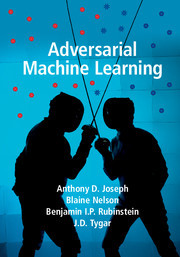Adversarial Machine Learning
Langue : Anglais
Auteurs : Joseph Anthony D., Nelson Blaine, Rubinstein Benjamin I. P., Tygar J. D.

This study allows readers to get to grips with the conceptual tools and practical techniques for building robust machine learning in the face of adversaries.
Written by leading researchers, this complete introduction brings together all the theory and tools needed for building robust machine learning in adversarial environments. Discover how machine learning systems can adapt when an adversary actively poisons data to manipulate statistical inference, learn the latest practical techniques for investigating system security and performing robust data analysis, and gain insight into new approaches for designing effective countermeasures against the latest wave of cyber-attacks. Privacy-preserving mechanisms and the near-optimal evasion of classifiers are discussed in detail, and in-depth case studies on email spam and network security highlight successful attacks on traditional machine learning algorithms. Providing a thorough overview of the current state of the art in the field, and possible future directions, this groundbreaking work is essential reading for researchers, practitioners and students in computer security and machine learning, and those wanting to learn about the next stage of the cybersecurity arms race.
Part I. Overview of Adversarial Machine Learning: 1. Introduction; 2. Background and notation; 3. A framework for secure learning; Part II. Causative Attacks on Machine Learning: 4. Attacking a hypersphere learner; 5. Availability attack case study: SpamBayes; 6. Integrity attack case study: PCA detector; Part III. Exploratory Attacks on Machine Learning: 7. Privacy-preserving mechanisms for SVM learning; 8. Near-optimal evasion of classifiers; Part IV. Future Directions in Adversarial Machine Learning: 9. Adversarial machine learning challenges.
Anthony D. Joseph is a Chancellor's Professor in the Department of Electrical Engineering and Computer Sciences at the University of California, Berkeley. He was formerly the Director of Intel Labs Berkeley.
Blaine Nelson is a Software Engineer in the Software Engineer in the Counter-Abuse Technologies (CAT) team at Google. He has previously worked at the University of Potsdam and the University of Tübingen.
Benjamin I. P. Rubinstein is a Senior Lecturer in Computing and Information Systems at the University of Melbourne. He has previously worked at Microsoft Research, Google Research, Yahoo! Research, Intel Labs Berkeley, and IBM Research.
J. D. Tygar is a Professor of Computer Science and a Professor of Information Management at the University of California, Berkeley.
Blaine Nelson is a Software Engineer in the Software Engineer in the Counter-Abuse Technologies (CAT) team at Google. He has previously worked at the University of Potsdam and the University of Tübingen.
Benjamin I. P. Rubinstein is a Senior Lecturer in Computing and Information Systems at the University of Melbourne. He has previously worked at Microsoft Research, Google Research, Yahoo! Research, Intel Labs Berkeley, and IBM Research.
J. D. Tygar is a Professor of Computer Science and a Professor of Information Management at the University of California, Berkeley.
Date de parution : 02-2019
Ouvrage de 338 p.
17.8x25.4 cm
Thème d’Adversarial Machine Learning :
© 2024 LAVOISIER S.A.S.



